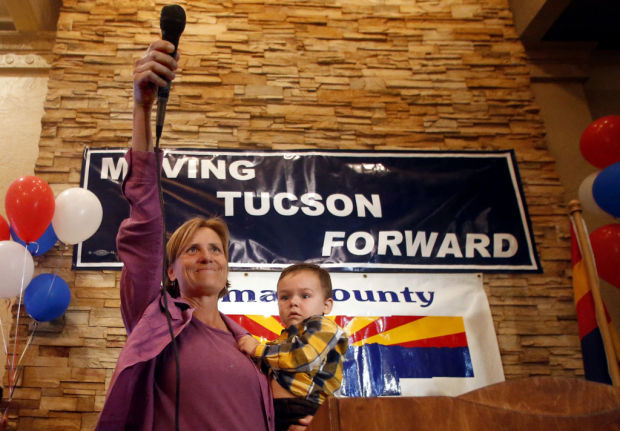A group of Tucson Republicans is suing the city, claiming its system for electing City Council members violates voters’ 14th Amendment rights.
The suit was filed Monday in federal court by the Public Integrity Alliance, Republican national committeeman Bruce Ash, former Pima County Board of Supervisor candidates Fernando Gonzales and Ann Holden, and former Tucson City Council candidates Lori Oien and Ken Smalley.
They are asking a judge for an injunction to block the city from holding this year’s City Council elections under the current rules.
The city’s system, established with the 1929 city charter, provides for partisan, ward-only primary elections and citywide general elections for council members. The mayor is nominated and elected citywide.
The group claims the system violates the Equal Protection Clause — the “one man, one vote” protection. Tucson’s system “unconstitutionally dilutes the votes” of some voters, depending on which ward they live in, the lawsuit says.
The city will file its answer to the lawsuit in the next several weeks, said city attorney Mike Rankin.
Ash, who lived just outside the city limits until recently, said to him the city’s system “has never made sense.”
“I have felt for some time, as a Republican activist and somebody who’s been a lifelong Tucsonan, that it’s unfair,” he said.
Tucson residents aren’t getting due representation when people across town can choose their representative to the City Council, Ash said.
The suit is the latest of many challenges to the city system, mostly by Republican interests, all of which have failed.
In 2012 the Arizona Supreme Court ruled Tucson, as a charter city, has a constitutional right to decide how to elect its council, as long as it complies with federal law — which federal officials have repeatedly found it does.
Rankin said that challenge also raised — unsuccessfully — questions about the Equal Protection Clause.
The U.S. Department of Justice has repeatedly pre-cleared Tucson’s system in an evaluation for voting rights fairness, Rankin added.
Rankin said if the group wants to change Tucson’s voting system it could do a ballot initiative to change the City Charter.
However, voters have often been asked that question.
Ballot initiatives were voted down in 1975, 1991 and 1993. More recent initiative campaigns in 1998, 2001 and 2003 failed to make it onto the ballot.
And this year, a city advisory committee tasked with recommending changes to the charter split on whether ward-only elections are a good move for the city.
“If the City Council won’t do it and the charter change committee doesn’t want to suggest the change to mayor and council, and it takes a lawsuit to do it — I wanted to be a part of that,” Ash said.
The plaintiffs’ attorney in the case, Kory Langhofer, said this suit is different than numerous previous challenges to Tucson’s elections system because it focuses on the federal constitutionality.
Tucson needs to have either ward-only elections or at-large elections, but not a combination, he said.
“What Tucson voters should be aware of is the way Tucson has set up its election system is almost unprecedented,” he said.
City Councilwoman Regina Romero said the lawsuit is the Republican Party’s latest attempt to go around the will of Tucsonans to change the election system. How the election system works should be up to Tucson voters, she said.
It’s no secret the Republicans dislike Tucson because the city is “a little blue island in a big red state,” she said.
Langhofer said the lawsuit isn’t about political parties.





